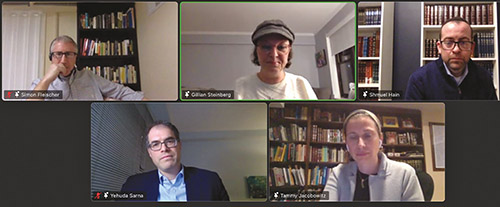



On February 24, SAR HS’s Machon B’Siach hosted a virtual program, “Living Through Change: Institutional Self- Reflection in the Age of Corona.” Part II focused on “Synagogue and Sacrifice: What Will We Be Talking About When We Talk about Shul?” Dr. Tammy Jacobowitz and Simon Fleischer moderated panelists Dr. Gillian Steinberg (HIR President), Rabbi Shmuel Hain (SAR Rosh Beit Midrash/YIOZ Rabbi), and Rabbi Yehuda Sarna (Executive Director, Bronfman Center for Jewish Student Life/NYU Chaplain/Chief Rabbi, Jewish Council of the Emirates).
Jacobowitz charged, “With expressed and suppressed anxiety around shuls, will we ever truly come back? What will we or should we come back to?”
Rabbi Hain responded, “We’ve built systems which hopefully outlast the pandemic. Our shul had distinct stages: when shul was shut, and then in June, once shul reopened.” Stage one was assisting congregants in need. “The whole period is a blur, officiating at COVID funerals and having my spouse on the frontlines at the hospital. Our new normal, once shul reopened, became all logistics, all the time; facilitating shul attendance and social services, especially for those not yet comfortable attending shul.”
Steinberg observed that this year showed what is important in shul life. “Without shul, we only have the friends we choose, not the people we wouldn’t necessarily choose. And that’s actually a deep loss.”
He added, “We can make tefillah more streamlined. I’ve appreciated shiva visits from afar. I hope we’ll maintain some mix of in-person and virtual life-cycle events, which enables greater participation. We can do the same with meetings, using Zoom to make it easier to be involved … Not everyone will bounce back after the last year. I’m not sure what congregants will need. Everything can’t just become ‘yay, we’re done, we’re all fine again.’”
Sarna explained his unusual shul model. “Most shuls operate on a transactional model, with a fee for service as an entry ticket. Become a member, you get stuff. We removed the fee.”
Hain highlighted, “The pandemic has taught us that you can find a lot of what shul does, elsewhere. To find a backyard minyan, Zoom Kabbalat Shabbat, classes online and get involved in social or festive projects, you need a WhatsApp group. But what shuls uniquely possess is a diverse, multi-generational, caring, religious community where we support and learn from each other. We have inner circles, but also outer circles. Zoom is useful for classes and large-group gatherings. Zoom doesn’t recreate the magic of social serendipity that a full-functioning, vibrant, in-person shul provides.”
He continued, “ Reconnecting with our weak ties is the real challenge of this next phase.” Despite his confidence people will return, he’s worried only close friends will be invited for Shabbat meals. “Different programming ideas help people realize the need for peripheral relationships. I miss being community-connectors. I think that’s our shuls’ true challenge, going forward.”
Sarna offered that our community will return faster than other communities. “We may even be better off afterwards, from a financial, philanthropic standpoint. A lot of people with a lot of money haven’t been spending money the way they usually do.”
Steinberg noted, “It depends what you mean by return to shul, return to Shabbat morning services or more expansively. Returning means a thousand things.”
Fearing decreased participation in YIOZ’s annual mishloach manot campaign, Hain was surprised with a record-setting response. “I think people miss each other; this is a token way to give mishloach manot to everybody.” They’ll come back in different ways; to shul, to a lecture or just participating in mishloach manot.
Jacobowitz summarized, “My head is buzzing with possibilities. You shifted the focus from sadness and loss to a realization that we have opportunity. What kind of praying do we want? What kind of activism do we want? What kind of relationships do we want with our neighbors?”
The final panel of this series will gather on Wednesday, April 21, covering “Family Matters; Remapping the Home in the Age of Corona.”
By Judy Berger











